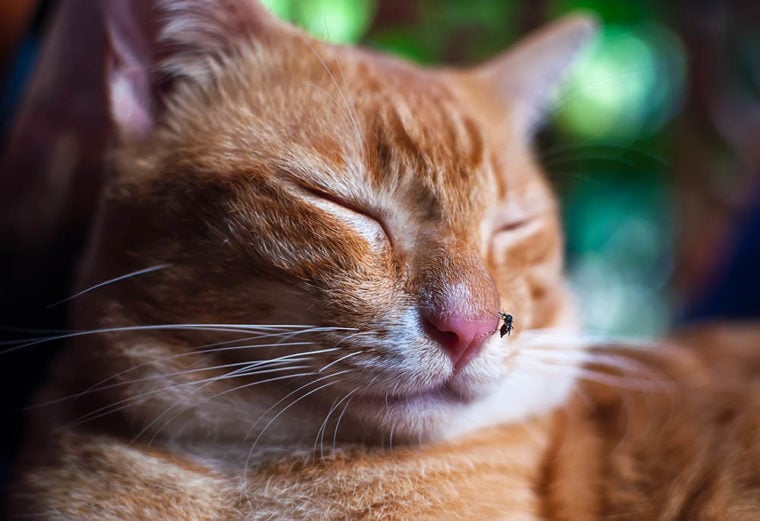
Summer is fast approaching, and as great as this time of year can be, mosquitoes are a serious pain in the behind—sometimes, quite literally. But did you know that cats can also get bitten by mosquitoes? This can cause your cat to become itchy, trigger an allergic reaction, and it may even transmit disease to them.
Read on to find out more about how mosquitoes can affect cats.
What Happens If a Cat is Bitten by a Mosquito?
Mosquitoes usually target cats’ noses and ears, as these are the most exposed areas. In some cases, your cat may get a little itchy in the area they’ve been bitten. In others, they may experience a more serious reaction requiring veterinary intervention.
Mosquito Bite Hypersensitivity
Also known as mosquito bite hypersensitivity is an allergic reaction caused by mosquito saliva. It causes lesions to appear on the affected area, redness, itching, swelling, or a crusted effect. In some cases, your cat’s lymph nodes may swell up and they may develop a fever.
It’s possible for these lesions to ulcerate if your cat scratches or bites the area to try and soothe the itching. Mild cases usually go away on their own, but in some cases, treatment is required.
Treatment often involves anti-inflammatory treatments and keeping your cat protected from future bites by keeping them indoors at dusk and dawn and doing your best to keep mosquitoes out—screening off windows is one of the most common ways to achieve this.

Heartworm Disease
Feline heartworm disease is another serious concern when it comes to cats and mosquito bites. It occurs when a mosquito that has fed on an infected cat bites an uninfected cat, which transfers heartworm larvae into the cat’s bloodstream. The larvae then travel to the heart and pulmonary arteries, where it develops into fully grown heartworms over 6–7 months.
It can be difficult to know if your cat has been infected because symptoms are so general and can also be seen in a number of other conditions. Watch out for sudden coughing and rapid breathing, as these are the most commonly observed symptoms. Other symptoms include lethargy, lack of appetite, shortness of breath, weight loss, and collapsing.
In some cases, heartworm is fatal—sometimes very suddenly—so if you spot any unusual symptoms like those described above, get your cat to a vet without delay. You can help to prevent the development of heartworms by making sure your cat follows a routine heartworm preventative treatment schedule. Treatment is difficult in cats and they may require surgery to physically remove the worms.
West Nile Virus
West Nile Virus is an infectious disease transmitted by mosquitoes to birds and mammals, including humans. Cats become infected by being bitten by a mosquito or eating small mammals already infected with the disease.
This condition is quite rare in cats, but symptoms to watch out for include lethargy, fever, and inflammation of the joints. Fortunately, most cats recover from the infection, and transmission to humans via cats or dogs has not been documented, so if your cat becomes infected, you should be fine.

 Preventing Mosquito Bites in Cats
Preventing Mosquito Bites in Cats
There are always a few pesky mosquitoes that somehow manage to make it through even our toughest lines of defense, but when it comes to prevention, we need to seal off their entry points as best we can. This means that if you haven’t got screens on your windows, you might want to consider getting some fitted.
Keep your cat indoors and your windows screened off at dusk and dawn when mosquitoes are more likely to attack. Change out their water frequently and avoid letting it stagnate, as mosquitoes target still water sources to breed. Clean out the water bowls to keep them as fresh as possible. You may want to consider getting a drinking fountain for your cat to keep things flowing. Check your outdoor areas for stagnant water such as pools and ponds.
If you choose to use a mosquito repellant, pick one that’s pet-friendly as some can be toxic to cats. If your cat has been bitten despite your best efforts, you can apply an antihistamine ointment that’s safe for use on pets. This may prevent infection from taking hold. If the bites start to appear infected or worsen in any way, take your cat to a vet to be treated.
Final Thoughts
The best treatment for mosquito bites in cats is more often than not prevention. Be vigilant of the areas where mosquitoes most often make their way into your home and keep them screened off if possible. Keep your cat’s water dish clean and change it out regularly. Seek immediate medical treatment if the bites worsen or don’t seem to be healing. Keep up with heartworm preventatives if they are recommended in your area.
Featured Image Credit: Irina Soboleva S, Shutterstock







